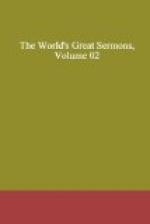The other is of the cannibals; some of whom, as credible relations tell us, have lived wholly or chiefly on the flesh of men; and consequently the whole, or the greater part of the substance of their bodies is made of the bodies of other men. In these and the like cases, wherein one man’s body is supposed to be turned into the substance of another man’s body, how should both these at the resurrection each recover his own body? So that this objection is like that of the Sadducees to our Savior, concerning a woman that had seven husbands: they ask, “whose wife of the seven shall she be at the resurrection?” So here, when several have had the same body, whose shall it be at the resurrection? and how shall they be supplied that have it not?
This is the objection; and in order to the answering of it, I shall premise these two things:
1. That the body of man is not a constant and permanent thing, always continuing in the same state, and consisting of the same matter; but a successive thing, which is continually spending and continually renewing itself, every day losing something of the matter which it had before, and gaining new; so that most men have new bodies oftener than they have new clothes; only with this difference, that we change our clothes commonly at once, but our bodies by degrees.
And this is undeniably certain from experience. For so much as our bodies grow, so much new matter is added to them, over and beside the repairing of what is continually spent; and after a man come to his full growth, so much of his food as every day turns into nourishment, so much of his yesterday’s body is usually wasted, and carried off by insensible perspiration—that is, breathed out at the pores of his body; which, according to the static experiment of Sanctorius, a learned physician, who, for several years together, weighed himself exactly every day, is (as I remember) according to the proportion of five to eight of all that a man eats and drinks. Now, according to this proportion, every man must change his body several times in a year.
It is true indeed the more solid parts of the body, as the bones, do not change so often as the fluid and fleshy; but that they also do change is certain, because they grow, and whatever grows is nourished and spends, because otherwise it would not need to be repaired.
2. The body which a man hath at any time of his life is as much his own body as that which he hath at his death; so that if the very matter of his body which a man had at any time of his life be raised, it is as much his own and the same body as that which he had at his death, and commonly much more perfect; because they who die of lingering sickness or old age are usually mere skeletons when they die; so that there is no reason to suppose that the very matter of which our bodies consists at the time of our death shall be that which shall be raised, that being commonly the worst and most imperfect body of all the rest.




